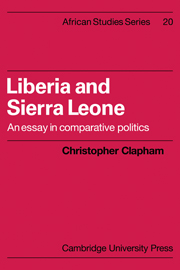Book contents
- Frontmatter
- Contents
- List of maps, tables and figures
- Preface
- Map A Liberia and Sierra Leone in West Africa
- 1 Political Comparison
- 2 Historical Summary
- 3 Resources
- 4 Rules
- 5 Political Allocation at the Centre
- 6 Centre and Periphery
- 7 Aspects of Political Economy
- 8 Concluding Review
- Statistical Appendix
- Bibliographical Note
- Notes
- Index
3 - Resources
Published online by Cambridge University Press: 15 January 2010
- Frontmatter
- Contents
- List of maps, tables and figures
- Preface
- Map A Liberia and Sierra Leone in West Africa
- 1 Political Comparison
- 2 Historical Summary
- 3 Resources
- 4 Rules
- 5 Political Allocation at the Centre
- 6 Centre and Periphery
- 7 Aspects of Political Economy
- 8 Concluding Review
- Statistical Appendix
- Bibliographical Note
- Notes
- Index
Summary
POLITICAL RESOURCES AND SOCIAL CLEAVAGE
Political resources derive from social cleavages which can be made relevant to competition for the benefits which the political system has to offer. In a totally homogeneous society, if such an impossible abstraction can be conceived, political competition would be reduced to a clash of personalities, which would themselves then become resources. In more differentiated situations, personalities are generally subordinated to competition between groups whose divisions are seen as being politically relevant. Votes, bribes, military coups and so forth are merely means by which these divisions are converted into a politically usable form. Similarly, political issues become important only in so far as they can be used to mobilise the distinctions between members of different and potentially rival groups; ideologies serve the same function in a rather more coherent and longstanding way, whether they be nationalist ones designed to sharpen the distinction between those within the political community and those outside it, or particularist ones designed to heighten the self-identity of internal competing groups.
For convenience of exposition, these cleavages – in Liberia and Sierra Leone as elsewhere – may be divided into two categories: vertical cleavages between groups which identify themselves, at least in some political contexts, as different; and horizontal ones between groups having varying access to status, wealth or power. The categories are obviously very closely connected, especially through relationships between communal identity and economic activity, and through the preferential access of some communities to special skills and the opportunities which these bring.
- Type
- Chapter
- Information
- Liberia and Sierra LeoneAn Essay in Comparative Politics, pp. 17 - 32Publisher: Cambridge University PressPrint publication year: 1976

